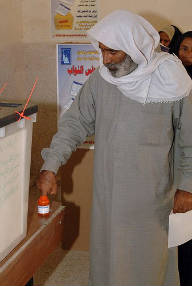
Iraq’s Electoral Commission sent a letter to the country’s parliament yesterday, warning that unless lawmakers move quickly and pass polling legislation, long-awaited provincial elections—supposed to occur before October 1—might not be held this year. The vote, if and when it happens, is an important linchpin in the American strategy to disperse political power from Baghdad to the local level, a move that would placate disgruntled Sunni groups that boycotted the 2005 election and, as a result, found themselves under the unwelcome jurisdiction of Shiite and Kurdish politicians—and their respective militias.
“We need at least three months after the law is passed to prepare so polling can be up to international standards,” Electoral Commission chairman Faraj al-Haidari said yesterday in an interview with Reuters. “Even if the law is passed in the coming days, we will only be able to vote at the end of the year. Any more delay, and we won’t be able to have elections this year.”
Breaking the impasse in parliament, however, will not be easy. Sectarian paranoia runs as deep there as it does on Iraqi streets, and the outcome of provincial elections could bring significant, and perhaps permanent, changes to the current power structure. For example, Kurdish politicians angrily walked out of parliament last week in response to a provision attached to the election legislation that would have provided for a “provincial council” in Kirkuk to include pre-determined numbers of Kurds, Sunnis, and Turkmen. Control of the city is a particularly sensitive subject for Kurds, who were driven out under Saddam Hussein’s “Arabization” program that sought to guarantee Sunni control over nearby oil fields. Kurds have flooded back into the city since the 2003 invasion, much to the displeasure of Sunni and Turkmen residents.
Other issues to be sorted out before elections can be held include: whether to pass a provision requiring that provincial councils be 25 percent female; whether religious imagery will be permitted on campaign materials; whether to allow voters to vote for individual candidates or only for political parties.
Photo used under a Creative Commons license from James Gordon.


